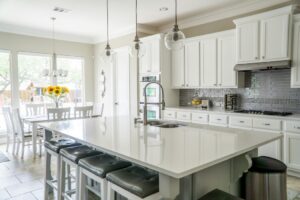Basics of Kitchen Plumbing
Kitchen plumbing involves all the water systems and fixtures installed in your kitchen. This includes everything from the sink and faucet to garbage disposal units and dishwashers.
Having a properly functioning kitchen plumbing system is important for many reasons. A good system ensures an efficient flow of water, promotes hygiene by disposing of waste effectively, saves on utility bills by preventing leaks, and improves overall convenience in meal preparation.
Components of Kitchen Plumbing
Sink and Faucet
The sink is central to your kitchen’s plumbing network because it’s where most of your water-related tasks take place. Various types exist, including single-bowl, double-bowl, undermount, or top-mount sinks, each suited to different needs.
The faucet controls water flow into the sink, with different models available: pull-out spray faucets, single-handle faucets, or commercial-style ones with flexible sprays that are ideal for cleaning vegetables or filling pots.
Installation can vary depending on the style but typically involves mounting onto a hole cut out from countertop material, then connecting pipes beneath through shut-off valves.
Garbage Disposal
Garbage disposals make it easier to manage food waste by grinding up small bits, which then go down the drain instead of the trash bin. Regular maintenance helps avoid common issues like jams due to clogs formed when non-food items accidentally get dropped inside the unit.
Dishwasher
Dishwashers require separate connections for the hot water supply line and a drainage pipe leading back into the sewer line underneath the house floor structure. Always consider these factors during the installation process itself before deciding on placement within the cabinet arrangement.
Common Kitchen Plumbing Problems
Leaky Faucets
Leaky faucets often result from worn-out rubber washers inside the valve seat needing replacement. Sometimes, the issue could also be related to a corroded valve seat causing improper sealing, thus leading to a continuous dripping noise even after closing the handle tightly enough to stop water flow.
Clogged Drains
Drain clogs are often caused by the accumulation of food particles, fat, and grease, which can be resolved using a plunger or hand auger tool if the blockage isn’t too deep down into the pipe length.
Garbage Disposal Issues
Garbage disposal issues can arise from things like dull blades causing inefficient grinding, leakages around seals, or clogging within the drain line itself.
Preventive Measures for Kitchen Plumbing Issues
Regular maintenance is key to keeping your kitchen plumbing system running smoothly. This includes tasks such as regularly cleaning sink drains with a mixture of baking soda and vinegar followed by a hot water flush to keep them clear; sharpening garbage disposal blades using ice cubes once a month; and checking dishwasher hoses periodically for any signs of wear and tear.
Another important aspect involves understanding proper use guidelines – knowing what not to put down garbage disposals (like bones or fibrous vegetables) and avoiding harsh chemical cleaners that could potentially damage pipes.
When to Call a Professional Plumber
While some minor repairs might seem easy enough to handle oneself, especially following DIY instructions available online, always remember safety should come first. If ever unsure about something, it’s best to leave the job to professionals who have the right skills, training, experience, tools, and knowledge.
FAQ Section
Q: How often should I clean my kitchen drains?
A: Cleaning once a month is generally sufficient, but frequency can vary based on usage and type of waste disposed of.
Q: What causes leaky faucets in kitchens?
A: The most common cause is a worn-out rubber washer inside the valve seat. Other issues might include a corroded valve seat or improperly installed parts.
Q: When should I call a professional plumber instead of doing it myself?
A: If you’re unsure about what to do, don’t feel comfortable handling tools, or if the problem persists despite your efforts, then it’s time to call professionals who are equipped to deal with such situations effectively without causing further damage, possibly leading to more expensive repairs later.
Conclusion
To sum up, maintaining your kitchen’s plumbing system involves understanding its basic components – sinks and faucets, garbage disposals, and dishwashers; knowing how to identify common problems like leaks, clogs, and disposal issues, as well as prevention strategies to ensure the longer lifespan and functionality of these elements; and recognizing when professional help may be necessary for certain cases. Regular maintenance and proper usage can prevent many issues, but always prioritize safety and seek professional assistance when in doubt.
Contents








